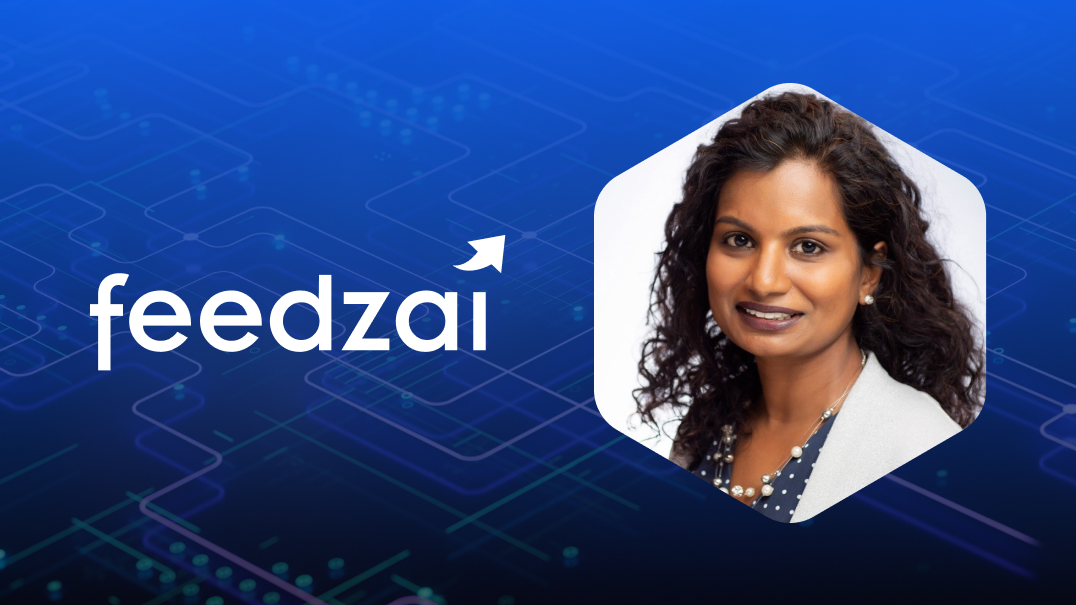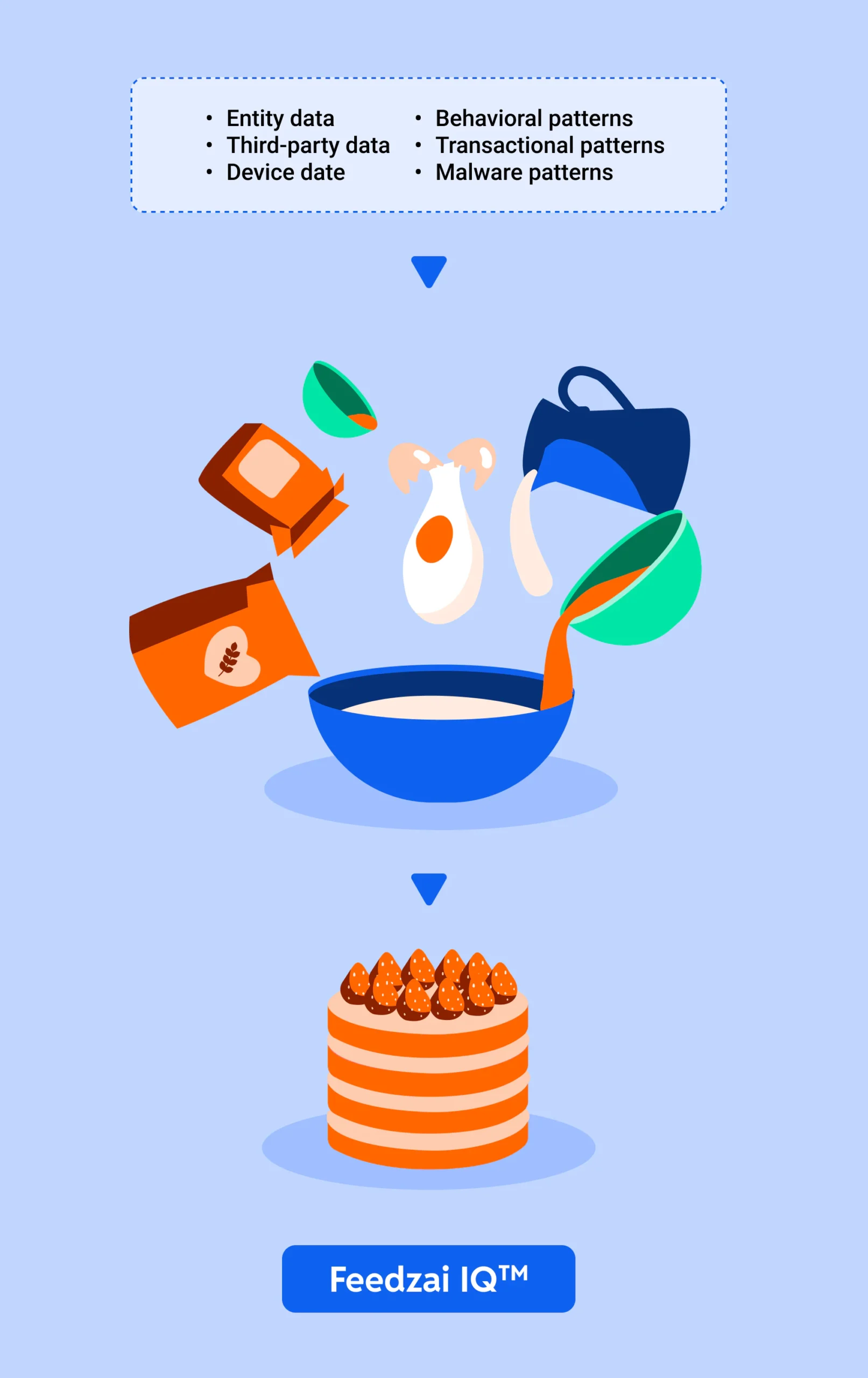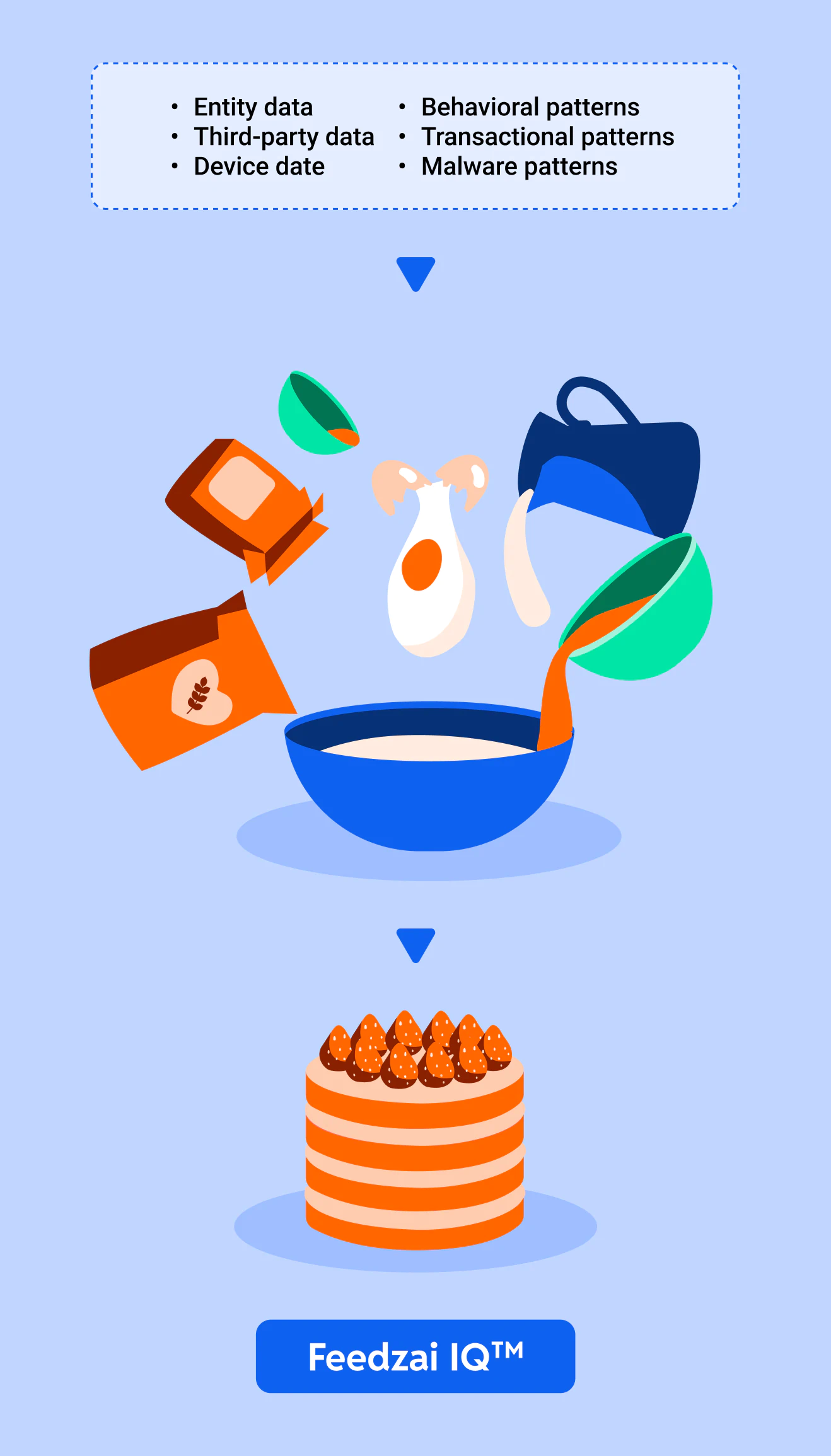 by Anusha Parisutham5 minutes • AI & Technology • June 3, 2025
by Anusha Parisutham5 minutes • AI & Technology • June 3, 2025
How Feedzai IQ™ Is Redefining Fraud Intelligence

Imagine going into a bakery and ordering a cake. Instead of a delicious confection, you’re handed a box filled with flour, sugar, eggs, butter, and frosting— the ingredients needed to make a cake, but it’s not a cake. Many banks face a similar experience in fraud prevention. You have tons of raw data but often struggle to turn it into something truly tangible: That’s where Feedzai IQ™—our new AI solution for fraud prevention—comes into play. Feedzai IQ™ is a game-changer because it shifts the focus from sharing data to sharing fraud insights.
Think of it as the difference between handing someone a bag of baking ingredients and handing them a lovely dessert. Banks aren’t exchanging raw, sensitive data but actionable intelligence based on a massive network of transactions.
Key Takeaways
- While fraudsters freely share fraud intelligence, banks face obstacles around data privacy and regulatory compliance. While data consortium approaches hold promise, their execution often falls short.
- Feedzai IQ™ provides insights from a global network comprising over 100 clients, analysis of $8 trillion in payments, and 70 billion annual transactions.
- Feedzai IQ™ utilizes federated learning, rather than sharing sensitive data, to provide financial institutions with actionable insights.
- It is built on two key components: TrustScore and TrustSignals.
- TrustScore is a federated-learning risk score that assesses fraud and financial crime risks.
- TrustSignals for Acquirers provides fraud risk ratios for transaction details, including card BIN, email domain, and zip code, to approve valid transactions while preventing fraud.
Common Data-Sharing Issues for Banks
Fraudsters are constantly upping their game by sharing information, tactics, and even technology. They aren’t bound by the same rules and regulations as financial institutions, giving them a critical edge.
To level the playing field, many banks have turned to data sharing or consortium approaches. While the idea is sound in theory, the execution often falls short. In fact, Feedzai’s AI report recently found that only 34% of global financial professionals use consortium data to train AI models. This is due to several factors:
2025 AI Trends in Fraud and Financial Crime Prevention
Feedzai’s survey of 562 financial professionals shows the industry adjusting to new data responsibilities due to rapid AI adoption.

- Data quality and relevance: It doesn’t make sense to pay for something you can’t use, a common pain point for data consortiums. Not all data shared by consortium members is created or valued equally, resulting in unnecessary noise and false positives.
- Timeliness: Imagine getting the eggs you need for your cake one week too late. Not only are the eggs unusable, but it also throws off your baking plans. The same holds in data. Fraud moves fast, but delays in sharing or processing data can reduce its value as a fraud-fighting tool.
- Privacy and security: While it would be ideal to access the data you need at any time, it raises critical regulatory questions. Sharing sensitive data across different organizations poses significant privacy, security, and liability vulnerabilities.
- Reluctance to share: If you share something important you expect to get something of equal value in return. However, there is no such guarantee in a data consortium. An unwillingness among banks to exchange fraud data with competitors due to competitive disadvantages or unequal contributions can undermine consortium viability.
What Makes Feedzai IQ™ Stand Out in Fraud Detection and Intelligence?
Feedzai IQ™ is shaking things up. We’re not just about sharing data; we’re focused on sharing fraud intelligence through federated learning. Think of it this way: instead of getting a truckload of raw data and having to figure out what it all means, banks gain actionable insights—ready to use right away to detect and prevent fraud.


Here’s how Feedzai IQ™ stands apart from traditional data-sharing models:
- AI-Powered Insights: Feedzai IQ™ uses advanced AI algorithms to analyze data and extract risk intelligence. Financial institutions get smarter and faster insights into fraud patterns.
- Massive Network Intelligence: Feedzai IQ™ draws insights from a massive worldwide network of more than 100 clients, analysis of more than $8 trillion in payments, and 70 billion events annually. That’s a scale of intelligence that individual institutions simply can’t match.
- Actionable Results: By leveraging insights from Feedzai IQ™, financial institutions can enhance fraud detection, minimize false positives, and increase payment acceptance rates.
This massive scale delivers advanced algorithmic insights, boosting fraud detection, reducing false positives, and improving payment acceptance. Plus, global regulators support this model, encouraging banks and organizations to share critical information to prevent fraud.
How Do TrustScore and TrustSignal Enhance Transaction Security?
Feedzai IQ™ is built on two key components: TrustScore and TrustSignals.
- TrustScore: TrustScore delivers a federated learning-based risk score that uses real-time, network-wide intelligence to assess fraud and financial crime risk. Banks can gain a rapid understanding of the risks associated with a transaction.
- TrustSignals for Acquirers: Feedzai IQ™ provides fraud risk ratios for specific transaction elements, such as card BIN, email domain, and zip code, to help acquirers strike a balance between fraud prevention and the need to approve legitimate transactions.
Why is Federated Learning a Game-Changer for Data Privacy?
Federated learning flips the traditional data-sharing model on its head. Instead of financial institutions sending sensitive raw data to a central location, Feedzai IQ™ brings the AI to the data. This means the raw data stays put, living securely within each bank’s systems.
AI algorithms analyze metadata—the “data about the data”—to extract crucial insights. This approach significantly reduces data breach risks and enhances privacy, as no raw data is transferred or aggregated. It’s a smarter, safer way to collaborate on fraud prevention.
In summary, here’s how Feedzai IQ™ boosts fraud intelligence while protecting sensitive data.
- Using Federated Learning: Feedzai IQ™ uses federated learning eliminating the need to share raw or historical data. Instead, what’s shared is metadata from each customer’s instance, based on insights from observed fraud trends and patterns.
- Faster Time to Value: Financial institutions see rapid results with an AI risk score and aggregated risk signals based on confirmed fraud outcomes. Both TrustScore and TrustSignals can be quickly accessed with no need to change existing workflows.
- A Privacy-first Approach to Fraud Prevention: Feedzai IQ™ focuses on protecting privacy, eliminating common risks, security concerns, and regulatory compliance questions. Fraud detection and payment acceptance can both improve without sharing sensitive information.
What Real-World Results Have Institutions Seen with Feedzai IQ™?
Feedzai IQ™ is already seeing promising results in improving fraud detection and reducing false positives. Among the success stories:
- An EU-based payment provider saw a 4x increase in fraud detection and a 50% reduction in false positive alerts using the Feedzai IQ™ TrustScore.
- Acquirers in the Feedzai community have seen a 27% improvement in payment acceptance rates and reduced alerts by 270,000 with Aggregated TrustSignals.
Much like a seasoned baker who understands the nuances of each ingredient and the delicate balance required for a perfect creation, Feedzai IQ™ meticulously processes vast amounts of raw, disparate data. This raw data, which may include transactional details, customer behavior patterns, device information, and network activity, serves as the fundamental input. However, on its own, this data is often fragmented and lacks immediate meaning in the context of identifying and preventing sophisticated fraud schemes.
Banks gain a granular, real-time view of risk and the ability to make faster decisions with actionable data. It’s the difference between mixing multiple ingredients to make a cake and slicing the best-looking piece for yourself.
Resources
- Blog: How AI is Helping Fight Back Against Financial Crime
- Webinar: The Next Level of Defense: Aggregated Risk Intelligence
- Solution Sheet: Feedzai as a Service
- Solution: Feedzai IQ™
All expertise and insights are from human Feedzaians, but we may leverage AI to enhance phrasing or efficiency. Welcome to the future.